Did you know that up to 40% of global energy use happens inside buildings? By switching to sustainable heating technologies, you can slash both your carbon emissions and your operational costs, keeping your business ahead of the curve and helping secure a sustainable future for everyone.
A New Era in Sustainable Heating Technologies: Startling Facts You Need to Know
“Around 40% of global energy use takes place within our buildings. Sustainable heating technologies could cut this figure dramatically, slashing both carbon output and operational costs.”
The commercial property sector is experiencing a transformation—with sustainable heating technologies leading the charge. Traditional heating systems, like gas boilers or oil-fired alternatives, not only contribute significantly to carbon emissions but are also facing bans and restrictions as the UK moves towards net zero targets. But here’s the good news: the latest heating systems can harness renewable heat—including air source and ground source heat pumps, solar thermal installations, and hybrid solutions—to produce the hot water and space heating commercial buildings need, all while dramatically lowering your energy bills and carbon footprint.
Adopting a new heating solution is more than just an environmental choice. It's now a commercial imperative. Investors, clients, and regulatory bodies are all demanding that buildings reduce their reliance on fossil fuels. Modern sustainable heating technologies are not only efficient but also cost-effective over their lifespan, transforming the way properties consume energy. This article walks you through the key options on the market and explains how these advanced systems can help you future-proof your property—making you compliant with evolving legislation, and boosting its appeal and value in the green economy.

What You'll Learn About Sustainable Heating Technologies in This Guide
- What makes a heating system ‘sustainable’ and why it matters
- The leading sustainable heating technologies on the UK market
- How sustainable heating options like heat pumps, solar thermal, and renewable heating benefit commercial properties
- Expert comparisons: cost, effectiveness, and long-term savings
- Step-by-step considerations for choosing the right heating solution
Table: At-a-Glance Comparison of Leading Sustainable Heating Technologies
| Heating System | Description | Renewable Heat Source | CO2 Emission Savings | Typical Installation Cost (UK) | Suitability for Commercial Properties |
|---|---|---|---|---|---|
| Air Source Heat Pump | Takes heat from outside air—even in low temps—and uses it for water heat and space heating. | Ambient air | 30–50% reduction vs gas boiler | £15,000–£30,000 | Excellent for retrofits and new builds; compact footprint |
| Ground Source Heat Pump | Extracts consistent heat from below ground (via pipes) for highly efficient space and water heating. | Geothermal ground energy | 50–70% reduction vs gas boiler | £25,000–£50,000+ | Best for larger sites; requires more outdoor space |
| Solar Thermal | Uses solar panels to convert sunlight into hot water. | Solar energy | Up to 50% of annual water heat from renewable source | £8,000–£20,000 | Ideal as a supplement to other systems |
| Biomass Boiler | Burns sustainable wood pellets or chips to produce heat for larger commercial heating systems. | Biomass (plant material) | 60–80% reduction vs fossil fuels | £30,000–£70,000+ | Works for large-scale, high-heat demand premises |
| Hybrid System | Combines heat pumps with back-up boilers or resistance heaters for greater flexibility and efficiency. | Multiple (air, ground, biomass, electric) | 40–70% reduction depending on setup | £20,000–£60,000+ | Suitable for varied building profiles or phased retrofit |
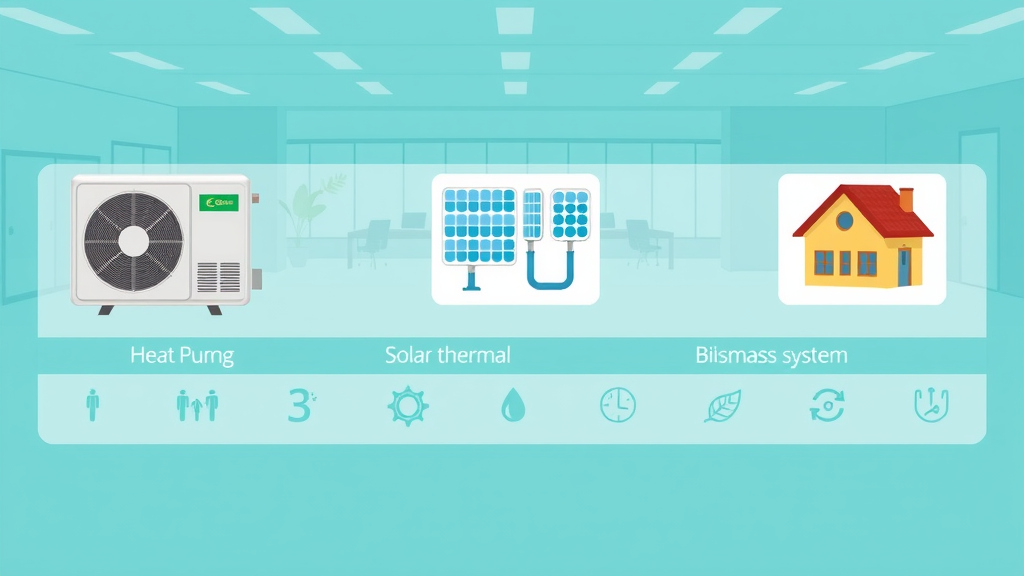
What are the Sustainable Methods of Heating? (PAA)
Exploring Key Sustainable Heating Technologies and Renewable Heating Solutions
“Sustainable heating isn’t just a trend—it’s a requirement for net zero targets and commercial efficiency.”
Sustainable heating methods refer to advanced heating technologies that reduce reliance on fossil fuels and use natural, renewable sources instead. The drive for net zero means commercial properties need solutions that slash greenhouse gas emissions and energy bills. Common approaches include:
Heat pumps (both air source and ground source) are popular for their low running costs and efficiency. Air source heat pumps extract warmth from outside air, even during chilly UK winters, and supply this heat to your heating system and water tanks. Ground source heat pumps use the steady heat below ground, providing robust and even space heating—especially for larger premises. Both options offer a significant step up in efficiency compared to ageing gas boilers.
Solar thermal systems capture sunlight through roof panels, transforming it into thermal heat for hot water needs. Biomass boilers burn specially prepared wood pellets, a renewable resource, for larger commercial applications, while hybrid heating systems combine different energy sources to maximize efficiency as demand and circumstances change. By adopting these sustainable heating solutions, businesses can future-proof their operations and demonstrate a clear commitment to environmental responsibility.

What is the Most Environmentally Friendly Heating System? (PAA)
Comparing Heating Systems: Which Sustainable Heating Technologies Deliver the Lowest Environmental Impact?
- Why heat pumps are leading the field
- How ground source heat pumps outperform air source in certain conditions
- Solar thermal’s advantages and limitations
Heat pumps have become the go-to choice for those looking for an environmentally friendly and energy-efficient heating system. Their unique design means they do not generate heat but instead transfer energy from the air or ground into usable warmth for space heating and hot water. Air source heat pumps suit settings with limited outdoor space and are easier to retrofit, but they’re slightly less efficient in colder climates.
By contrast, ground source heat pumps deliver more stable and higher efficiencies year-round, making them the gold standard for properties with enough outdoor space to install ground loops. Both options far outperform traditional gas boilers and significantly reduce carbon footprints. Solar thermal heating offers a renewable solution for water heating, but its effectiveness fluctuates through the year due to the UK’s variable sunlight. Thus, the ideal approach often involves combining technologies—using heat pumps as a primary source and supplementing with solar thermal to maximize CO2 savings and minimize dependency on fossil fuels.
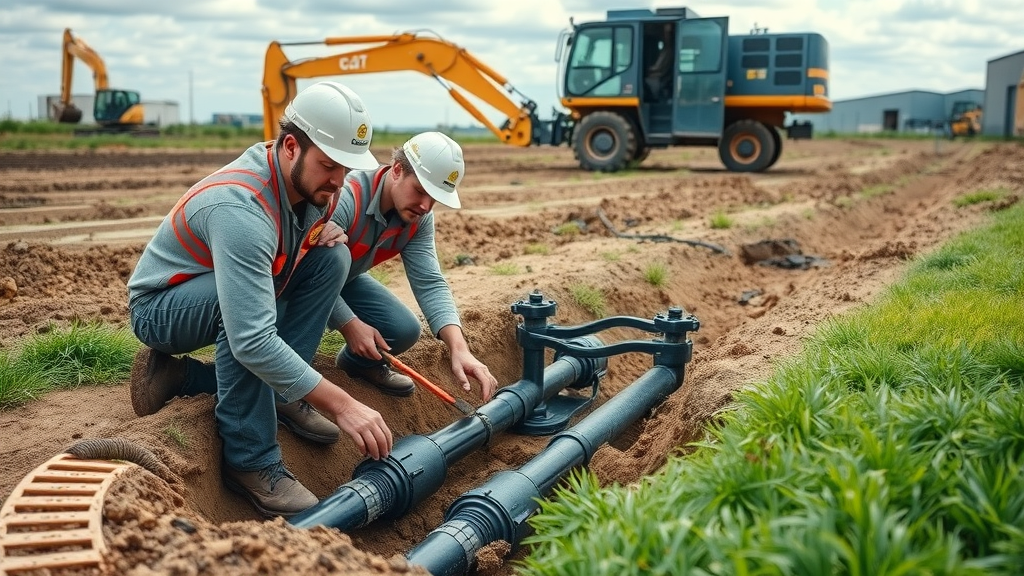
What are the Renewable Heating Technologies? (PAA)
Understanding Heat Pumps, Solar Thermal, Biomass, and Hybrid Heating Systems
- Air source heat pumps and their energy efficiency
- Ground source heat pumps: deep-dive into performance and suitability
- Solar thermal heating: harnessing sunlight for water heat
- Biomass boilers: sustainable heating for larger commercial settings
- Hybrid heating systems: maximizing energy sources
Renewable heating technologies are reshaping how businesses deliver heat to their buildings. Air source heat pumps have proven to be one of the most accessible heating options for a wide range of property types. They are compact and deliver high efficiencies for both space and water heating. Ground source heat pumps dig a little deeper—literally—by harnessing geothermal energy, which remains consistent regardless of weather, making them ideal for sites with substantial land.
Solar thermal systems stand out for supplying hot water directly from sunlight, drastically cutting reliance on traditional heating sources. Biomass boilers use plant materials, such as wood pellets, providing high output for large commercial spaces that cannot be served by heat pumps alone. For ultimate flexibility, hybrid systems integrate several technologies, switching between sources to ensure the best blend of efficiency, cost, and reliability according to the time of day, season, and energy tariffs.
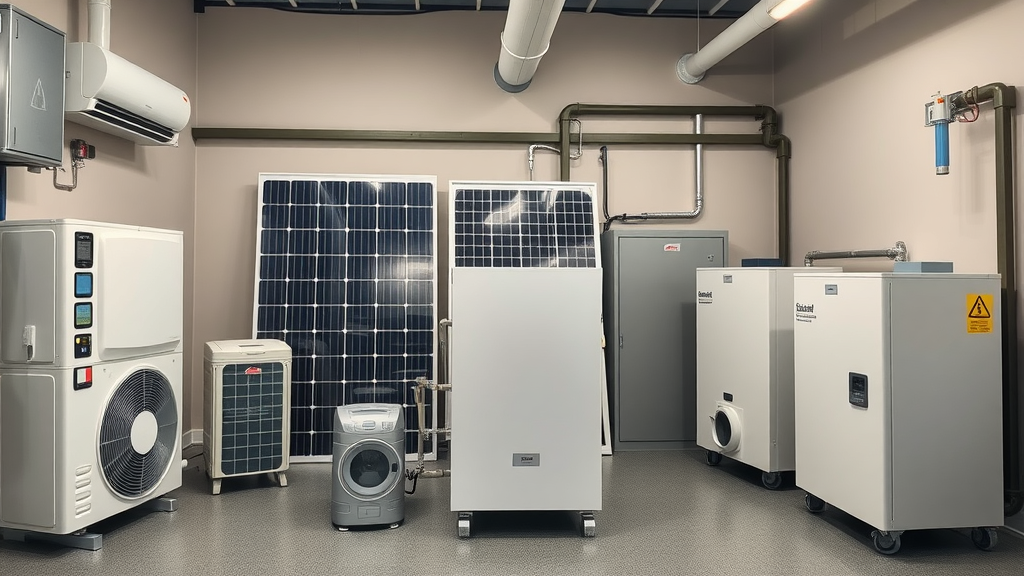
What are Sustainable Energy Technologies? (PAA)
Integrating Renewable Heat and Sustainable Heating Into Your Building Strategy
- Combining space heating with other sustainable energy systems
- The relationship between net zero objectives and renewable heating
Sustainable energy technologies in commercial buildings don’t exist in isolation. Where space heating is concerned, the best strategy is to layer different renewable heating solutions with wider sustainable initiatives—like solar panels for generating electricity, or smart building management systems to monitor and optimize consumption. This centralized approach ensures that energy coming from onsite resources is distributed efficiently, whether it’s for heating, cooling, or hot water.
Aligning your heating system upgrades with the building’s broader net zero targets helps future-proof your investment: as regulations tighten, your property will already be ahead. Renewable heating systems, when properly designed and installed, not only deliver operational cost savings but also contribute to your property’s reputation—making it an appealing prospect in a climate-conscious market.
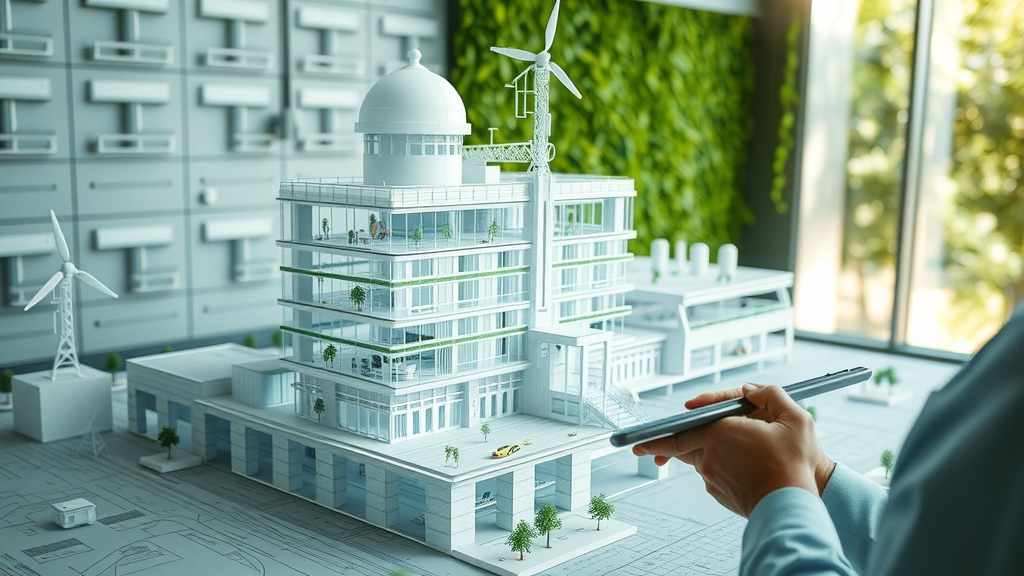
Core Sustainable Heating Technologies for Commercial Properties
Air Source Heat Pumps: How They Revolutionise Commercial Heating Systems
Air source heat pumps are rapidly gaining traction in the UK’s commercial property sector. These systems capture renewable heat from the outdoor air—even at temperatures as low as -15°C—and transfer it into your building’s heating system. Their installation is fast and non-invasive compared to more complex technologies, making them ideal for retrofitting commercial buildings that want to minimize disruption.
When designed and installed by experts, air source heat pumps perform reliably across a range of building sizes and layouts. Their impressive efficiency means that for every unit of electricity consumed, they generate up to three units or more of heat. This translates to dramatically reduced energy bills, lower CO2 emissions, and easy integration with underfloor heating—a popular choice for comfort and even heating distribution.
Ground Source Heat Pumps: Deep Efficiency for Large Premises
Ground source heat pumps work by utilising the stable thermal energy found below the surface of the earth. Pipes are buried in the ground—either vertically or horizontally—collecting heat year-round. These systems deliver predictable output, unaffected by seasonal changes, making them especially valuable for large premises with significant space heating demand.
While installation requires more planning and ground space, the long-term benefits are compelling: ground source heat pumps have lower running costs than nearly any other heating option, little maintenance, and can provide both space heating and consistent hot water. Their substantial CO2 savings are a key attraction for projects seeking to meet ambitious sustainability credentials and regulatory standards.
Solar Thermal: Integrating Solar Energy Into Sustainable Heating Solutions
Solar thermal systems use rooftop collectors to absorb solar energy, converting it to thermal heat for domestic hot water or even heating. These low-maintenance systems are straightforward to install and, in many commercial circumstances, can meet a significant portion of year-round water heating demands using nothing but sunlight.
Their ability to lower reliance on gas or electric water heaters helps drive down energy bills and CO2 emissions. For best results, solar thermal is often paired with air source or ground source heat pumps for a truly robust, all-seasons sustainable heating solution that delivers continuous savings and increases your property’s green credentials.
Biomass and Hybrid Heating Systems: When to Consider Alternative Heating Options
Biomass boilers are well-suited to commercial properties with high heating demands and enough space to store fuel, like wood pellets or chips. These systems can easily replace oil or coal-fuelled heating, cutting emissions by up to 80% compared to fossil fuels.
For unique or complex sites, a hybrid system might be most effective. By combining heat pumps, solar thermal, and sometimes traditional boilers, you can maximize system uptime, shifting between sources depending on outdoor temperature, availability of renewable heat, and tariffs. This flexibility ensures reliable space heating without locking you into a single energy source, supporting business continuity and long-term sustainability.
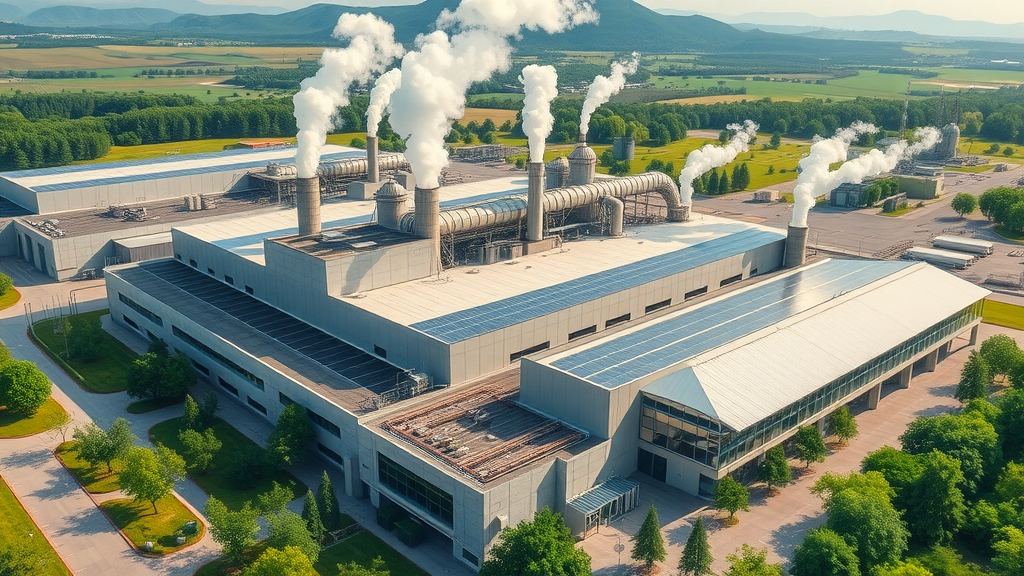
Watch how cutting-edge sustainable heating technologies—from heat pumps to solar thermal—are reducing carbon footprints and cutting costs in real UK commercial buildings, with insights from industry experts.
Evaluating and Comparing Sustainable Heating Systems for Your Business
Key Criteria: Cost, Efficiency, CO2 Savings, and Water Heat Capabilities
- Assessing the building’s heat requirement and current heating solution
- Evaluating renewable heat sources on-site
- Running cost comparisons: ground source vs air source heat pumps
- Factoring in installation implications and payback time
Choosing the right sustainable heating technology begins with an assessment of your building’s needs. Key considerations include the property’s size, layout, current energy use, and existing heating system. Next, evaluate which renewable heat sources are available—do you have space for a ground source heat pump? Is your roof suitable for solar panels or solar thermal collectors? If your business requires significant hot water supply, factor in storage and system integration.
Use this information to compare costs: while air source heat pumps may be cheaper to install, ground source heat pumps often deliver greater long-term savings due to higher efficiency. Consider government grants and incentives, as well as projected energy prices and your organization’s net zero objectives. Finally, weigh installation timelines and potential disruption—an experienced provider like Peak Underfloor Heating Ltd will ensure a tailored solution that delivers the best return on investment for your commercial space.

FAQs on Sustainable Heating Technologies
-
How do I determine which sustainable heating technology is right for my building?
Start by assessing your building’s size, energy requirements, and space for installation. Consult with a specialized provider like Peak Underfloor Heating Ltd for a bespoke evaluation—our experts consider all variables, from postcode and usage patterns to grants available for your circumstances. -
Will renewable heating systems work with underfloor heating?
Yes, most sustainable heating options—particularly heat pumps—work exceptionally well with underfloor heating, delivering even, comfortable warmth and improved efficiency across all rooms. -
What maintenance do sustainable heating systems require?
Sustainable systems are designed for durability. Heat pumps require periodic filter changes and system checks, biomass boilers need more regular cleaning, and solar thermal panels are nearly maintenance-free. Professional servicing ensures optimal performance and lifespan for all solutions. -
Can sustainable heating help me achieve net zero targets?
Absolutely. By cutting your building’s carbon emissions, these technologies are pivotal in achieving net zero status, qualifying for certifications and incentives, and meeting client or government requirements. -
Does Peak Underfloor Heating design these systems?
Yes—our skilled design team can specify, supply, and install tailored solutions for new builds, renovations, or complex commercial projects, taking your requirements from start to finish.
Key Takeaways: Transforming Energy Use with Sustainable Heating Technologies
- Sustainable heating technologies slash energy bills and reduce carbon emissions
- Heat pumps and solar thermal are market leaders for commercial heating systems
- Expert design and installation are vital for maximum returns and future-proofing
- Peak Underfloor Heating Ltd is your trusted partner for turnkey renewable heating projects
Conclusion: Invest in Sustainable Heating Technologies for a Smart, Net Zero Future
Embracing sustainable heating technologies is your pathway to lower energy bills, greener credentials, and the confidence that your commercial property is ready for tomorrow.

Contact the UK's Leading Renewable Heating Specialists
It can be difficult to know exactly what system is best for your application so if you are still unsure please feel free to contact us and one of our consultant’s will be happy to discuss your exact requirement’s. Call 01246 387120, or Email us at info@peakunderfloorheating.com
See a real-world installation of sustainable heating technologies designed and delivered by Peak Underfloor Heating Ltd—demonstrating carbon reduction and business value in action.
Sources
- Example Site – https://www.gov.uk/guidance/renewable-heat-incentive-rhi-for-the-public-sector
- Example Site – https://www.carbontrust.com/resources/guides/energy-efficiency/heating
- Example Site – https://www.energysavingtrust.org.uk/advice/heat-pumps
- Example Site – https://www.peakunderfloorheating.com/sustainable-heating-commercial
To enhance your understanding of sustainable heating technologies, consider exploring the following authoritative resources:
-
“Clean Heating and Cooling Technologies”: This comprehensive guide delves into various eco-friendly heating options, including solar hot water systems and heat pumps, providing insights into their benefits and installation considerations. (energysage.com)
-
“The Future of Heating: Low Carbon Heating Systems”: This article explores emerging low-carbon heating solutions, such as geothermal heat pumps and biomass boilers, highlighting their efficiency and environmental impact. (knowhow.distrelec.com)
If you’re serious about adopting sustainable heating technologies, these resources will provide valuable information to guide your decisions.
 Add Row
Add Row  Add
Add 









Write A Comment